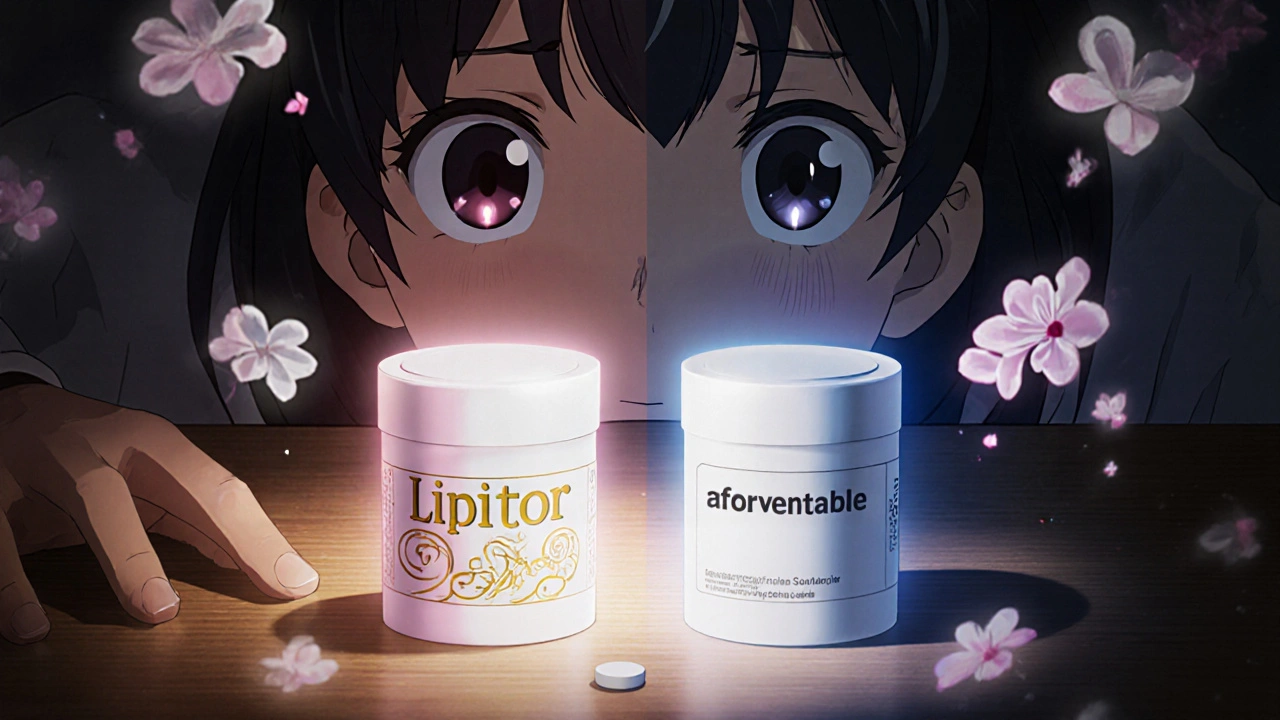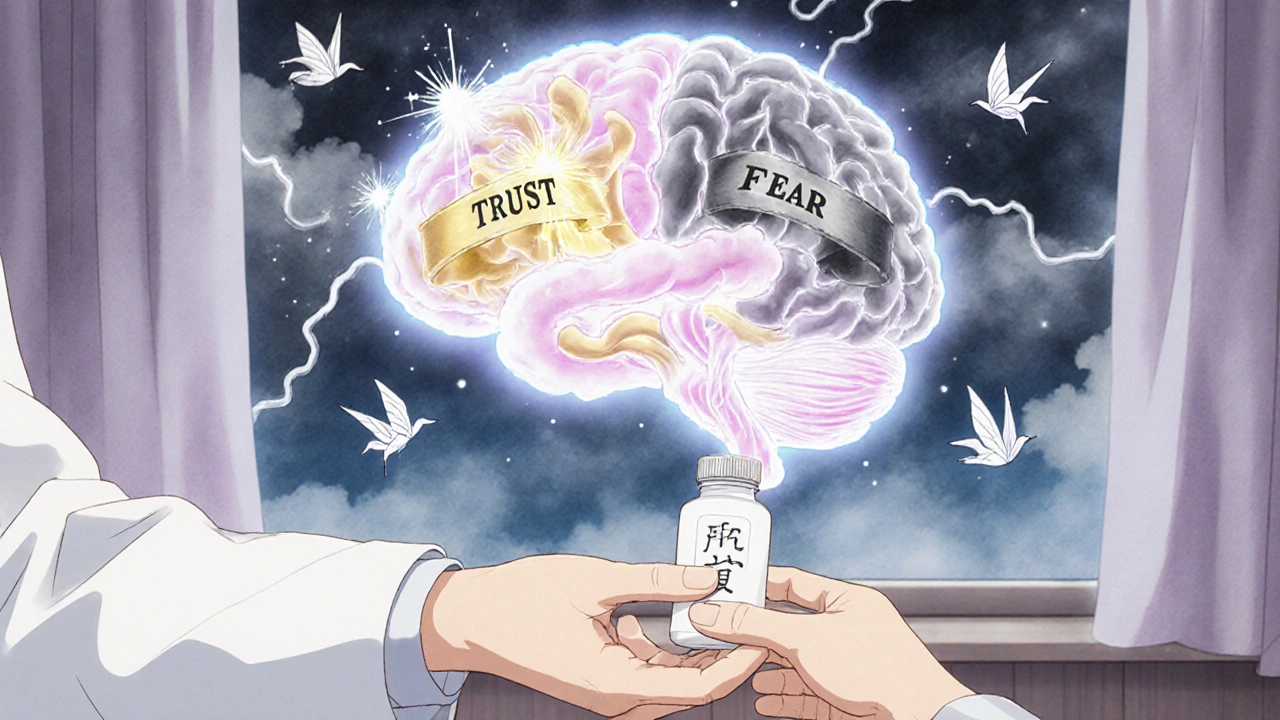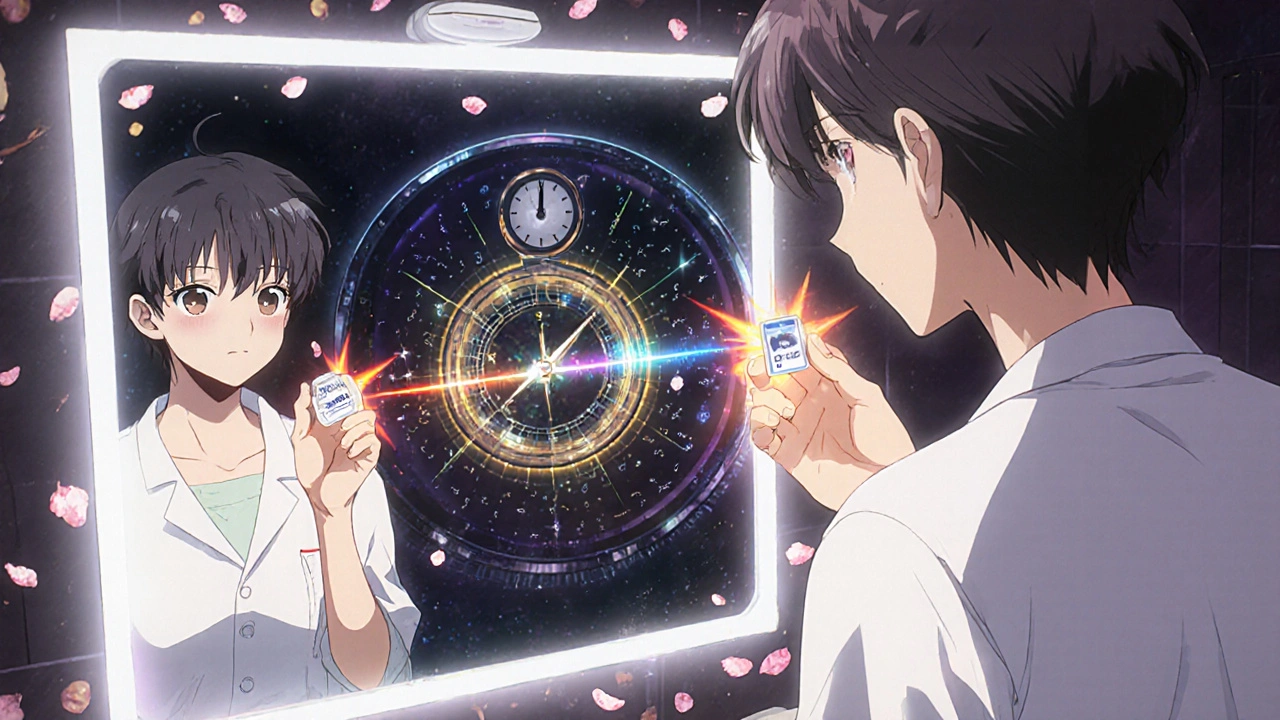
You take a pill. It’s supposed to help. But you feel nothing. Or worse-you feel worse. You check the label. It’s not the brand you’re used to. It’s generic. And suddenly, even though the chemistry is identical, your body seems to know the difference. This isn’t magic. It’s psychology. And it’s costing the U.S. healthcare system over a billion dollars a year.
Identical Pills, Different Results
Two pills. Same active ingredient. Same dose. Same manufacturer, sometimes even the same factory. One says "Lipitor." The other says "atorvastatin." One costs $10. The other costs $0.50. If you’re a scientist, they’re the same. If you’re a patient? They might as well be different planets. A 2014 study from the University of Auckland tested this exact idea. Researchers gave 87 students fake painkillers-plain sugar pills-but labeled them differently. Some were labeled as a well-known brand-name painkiller. Others were labeled as a generic version. The brand-labeled placebos reduced headache pain by 2.3 points on a 10-point scale. The generic-labeled ones? Only 1.1 points. That’s more than half the relief. And neither pill had a single molecule of ibuprofen in it. This isn’t an isolated case. In a 2014 Neurology study, Parkinson’s patients got a placebo injection. One group was told it cost $1,500. The other, $100. The $1,500 version improved motor function by 28% more. Brain scans showed more dopamine was released-just because of the price tag.Price Isn’t Just Money. It’s a Signal.
Your brain doesn’t think in pharmacokinetics. It thinks in cues. Price. Packaging. Brand name. These aren’t just marketing tricks-they’re biological triggers. A Harvard study from 2008 gave volunteers electric shocks. They were told they were getting a painkiller. Half were told it cost $2.50. The other half, $0.10. The expensive one worked better. Not because it was stronger. Because people believed it was stronger. The brain responded to the expectation of quality. The same thing happens with generics. When you see a cheap label, your brain assumes a cheap result. This is called the placebo effect-when a fake treatment produces real improvement because you believe it will work. But there’s also the flip side: the nocebo effect. That’s when you expect side effects, and then you get them-even if the drug is inert. A 2014 meta-analysis in JAMA Internal Medicine found that patients taking generic statins reported 2.1 times more muscle pain than those taking identical brand-name versions. No difference in chemistry. Just in perception. And in a 2017 study of 38,000 Medicare patients, those on generics had 12-15% higher hospitalization rates-not because the drugs failed, but because they stopped taking them.Why Generics Get the Short End of the Stick
Generic drugs are not inferior. They’re required by the FDA to be within 80-125% of the brand’s absorption rate. That’s a tight range. 98.5% of generics pass this test. But patients don’t know that. And when they do, they often don’t believe it. A 2014 Consumer Reports survey found 30% of Americans think generics are less effective. A 2020 Kaiser Family Foundation poll showed 41% feel like they’re getting "inferior medicine." That’s not ignorance. It’s conditioning. We’ve been told for decades that brand names mean quality. We’ve seen ads with sleek packaging, celebrity endorsements, and emotional storytelling. Generics? Usually white pills in a plain bottle. No story. No trust. The problem is worst in mental health and neurology. A 2013 Lancet Psychiatry review found antidepressant trials with generic labels had 11% lower response rates. Why? Because the brain’s response to antidepressants is heavily influenced by expectation. If you don’t believe the pill will help, your brain won’t release the serotonin or dopamine it needs to feel better. A 2021 Epilepsy Foundation survey found 39% of patients reported more seizures after switching to generics. But when neurologists checked EEGs, 78% of those cases showed no actual spike in seizure activity. The brain was tricking itself.
It’s Not Just About Pills. It’s About Trust.
The real issue isn’t the drug. It’s the relationship between patient and provider. When a doctor hands you a generic without explanation, you’re left to fill in the blanks. And your brain usually fills them with fear. But here’s the good news: education works. A 2018 University of Chicago study showed that just a 7-minute conversation explaining bioequivalence increased generic acceptance from 58% to 89%. Patients who understood the science were far more likely to stick with the medication. Six months later, 72% of them were still taking it. In the control group? Only 44%. Even better: how you say it matters. A 2020 JAMA Network Open trial trained doctors to use "positive generic messaging." Instead of saying, "This is the generic version," they said, "This generic version works exactly the same as the brand, but it saves you money." Results? 85% adherence versus 63% with the old approach. It’s not about tricking people. It’s about giving them the right context. Your brain doesn’t respond to facts alone. It responds to stories. And the story you tell about a pill changes how it works.What’s Being Done to Fix This?
The system is slowly waking up. In 2023, a University of Wisconsin trial tested "premium" generic packaging-designs that looked more like brand-name drugs. The result? A 37% drop in complaints about side effects. Patients didn’t know the pills were the same. But their brains did. The FDA is also testing digital tools. A new app called "Generic Confidence" uses augmented reality to show patients how the active ingredient in a generic matches the brand. In beta testing, users who used the app had 29% higher adherence. And researchers are looking at blockchain. Dr. Kate Faasse’s team is now running a $2.1 million NIH-funded study to see if letting patients trace a generic drug’s manufacturing history-seeing the same quality controls as the brand-can rebuild trust.
Who’s Most Affected?
The psychological gap isn’t equal. Older adults are more skeptical. A 2023 AARP survey found 78% of patients over 65 worry about generics. Only 49% of those under 35 do. That’s not because younger people are smarter. It’s because they’ve grown up with online reviews, direct-to-consumer ads, and a culture that values transparency. Low-income patients are hit hardest. A 2023 JAMA Psychiatry study found they experience 2.3 times stronger nocebo effects. Why? Because they associate cost with quality. If a pill is cheap, it must be weak. That’s not irrational-it’s survival logic. You’ve been taught that good things cost money. When you’re choosing between medicine and rent, the brain defaults to the worst-case scenario.What You Can Do
If you’re taking a generic and feeling worse:- Ask your doctor: "Is this the same as the brand?" Don’t be afraid to ask.
- Request a short explanation. Most doctors can give you one in under five minutes.
- Check your pharmacy’s website. Many list the manufacturer. If it’s the same company that makes the brand, that’s a good sign.
- If you’re switching back to the brand because of side effects, ask for a blood test or EEG if relevant. Often, the problem isn’t the drug-it’s your belief about it.
- Don’t assume patients know generics are equivalent.
- Use positive framing: "This generic works the same way, and it saves you $1,200 a year."
- Explain how expectations change brain chemistry. You don’t need to be a neuroscientist. Just say: "Your brain responds to what you believe. If you think it works, it works better."
- Consider handing patients a one-page fact sheet. It doesn’t have to be fancy. Just clear.
The Bigger Picture
Generics are one of the most powerful tools we have to make healthcare affordable. They save patients an average of $312 a year. They make up 90% of all prescriptions. But if patients stop taking them because they think they don’t work, all that savings vanishes. The cost of perception? $1.2 billion in unnecessary brand prescriptions. $318 billion in avoidable medical costs from non-adherence. And thousands of people suffering because their brain didn’t believe the medicine could help. This isn’t about marketing. It’s about biology. Your brain is part of your treatment. And if you don’t trust the tool, your brain won’t let it work. The future of medicine isn’t just better drugs. It’s better stories. Better conversations. Better trust.Do generic drugs have the same active ingredients as brand-name drugs?
Yes. By law, generic drugs must contain the same active ingredient, strength, dosage form, and route of administration as the brand-name version. The FDA requires them to be bioequivalent-meaning they deliver the same amount of medicine into your bloodstream at the same rate. The only differences are in inactive ingredients like fillers, dyes, or coatings-which rarely affect how the drug works.
Why do some people feel worse on generic medications?
It’s often not the drug-it’s the belief. When patients switch from a branded pill to a generic, they may unconsciously expect side effects or reduced effectiveness. This triggers the nocebo effect, where negative expectations cause real physical symptoms. Studies show patients report more side effects with generics-even when the pills are identical to the brand. This is psychological, not pharmacological.
Can the placebo effect work with generic drugs?
Yes-but only if the patient believes it will work. Placebo effects are powerful. In studies, sugar pills labeled as a brand-name drug produced nearly the same pain relief as the real drug. But the same sugar pills labeled as generic produced significantly less relief. The difference wasn’t the pill. It was the label. If a patient trusts the generic, their brain can respond just as strongly as it would to the brand.
Are generics less safe than brand-name drugs?
No. Generic drugs are held to the same safety and quality standards as brand-name drugs. They’re made in the same types of facilities, inspected by the same agencies, and must meet the same FDA requirements. The only real difference is cost. Safety concerns usually come from misinformation-not evidence.
How can I tell if my generic is working?
Track your symptoms the same way you did on the brand. Keep a simple journal: How’s your pain? Sleep? Mood? Energy? If you notice a change, talk to your doctor-but don’t assume it’s the drug. Sometimes, switching to a generic with a different inactive ingredient can cause minor issues (like stomach upset), but these are rare and fixable. The biggest reason people think generics don’t work? Belief. Reassess with your doctor, not your fear.
If you’ve been told to switch to a generic and you’re hesitant, ask for a conversation-not just a prescription. The science is clear: the pill doesn’t change. But your belief can change the outcome.
Laurie Sala
November 21, 2025 AT 13:24This is wild-I switched to generic statins last year and started having muscle cramps so bad I couldn’t sleep... then I found out my pharmacy switched manufacturers without telling me. I went back to the brand, and boom-gone. Not placebo. Not nocebo. Just bad generics. Why does the FDA even allow this?!
Lisa Detanna
November 22, 2025 AT 20:40I work in rural clinics and this is EVERY DAY. Older patients refuse generics because they think they’re ‘fake medicine.’ I hand them a printout of the FDA bioequivalence chart, show them the same factory logo on both bottles, and sometimes it works. But it’s exhausting. We need better tools-not more lectures.
Demi-Louise Brown
November 23, 2025 AT 03:23It is not surprising that psychological factors influence pharmaceutical efficacy. The mind-body connection is well-documented in clinical literature. The challenge lies not in the science, but in the systemic failure to communicate it effectively to patients. Education is not optional-it is foundational to therapeutic success.
Matthew Mahar
November 23, 2025 AT 08:21bro i took generic adderall and thought i was going insane for a week… then i checked the pill and it was from a different maker. i went back to the brand and my brain felt like it was reconnected to the universe. this isn’t placebo, this is my nervous system screaming for consistency. why is this even legal??
John Mackaill
November 23, 2025 AT 13:52I’ve seen this in the UK too. People assume cheap = bad. But when you explain that the same company often makes both, and show them the batch numbers… something clicks. It’s not about money. It’s about dignity. Nobody wants to feel like they’re on ‘second-class medicine’.
Casper van Hoof
November 24, 2025 AT 17:02The placebo effect, when understood through the lens of predictive processing theory, reveals that the brain is not merely responding to external cues-it is actively constructing reality based on prior Bayesian priors. The generic pill, lacking the cultural semiotics of brand prestige, fails to activate the neural reward pathways associated with therapeutic expectation. Thus, the pharmacological equivalence is rendered functionally irrelevant by the cognitive architecture of belief.
Ragini Sharma
November 25, 2025 AT 13:39lol i switched to generic omeprazole and got heartburn so bad i thought i was dying… turned out my pharmacy gave me the wrong batch. i called them, they said ‘oh we switched suppliers’… so now i just pay extra for the brand. why do we even bother??
Linda Rosie
November 25, 2025 AT 23:10Trust matters. The pill doesn't change. The belief does.
Lisa Lee
November 27, 2025 AT 07:00Canada has this figured out. We don’t have this placebo nonsense. Generics are just… medicine. No drama. No marketing. No emotional baggage. Why can’t America just be normal?
Jennifer Shannon
November 28, 2025 AT 23:53It’s heartbreaking, really. I used to be one of those people who swore by brand names-until my doctor sat me down and said, ‘Your brain is the real drug here.’ She showed me the FDA data, the same factory, the same active ingredient, even the same inactive filler in some cases. I cried. Not because I was mad-but because I realized I’d been letting advertising dictate my health. Now I take generics without a second thought. And I tell everyone. Not because I want to save money-I want to save lives. Because if your brain doesn’t believe the medicine can work, it won’t. And that’s not just a medical problem. It’s a cultural one. We’ve been sold a lie that expensive = better, and now we’re paying for it-in pain, in hospital visits, in lost time. The fix isn’t more science. It’s better storytelling. We need to stop treating patients like idiots and start treating them like people who deserve to understand their own bodies. And maybe-just maybe-if we start telling the truth, our bodies will start believing it too.